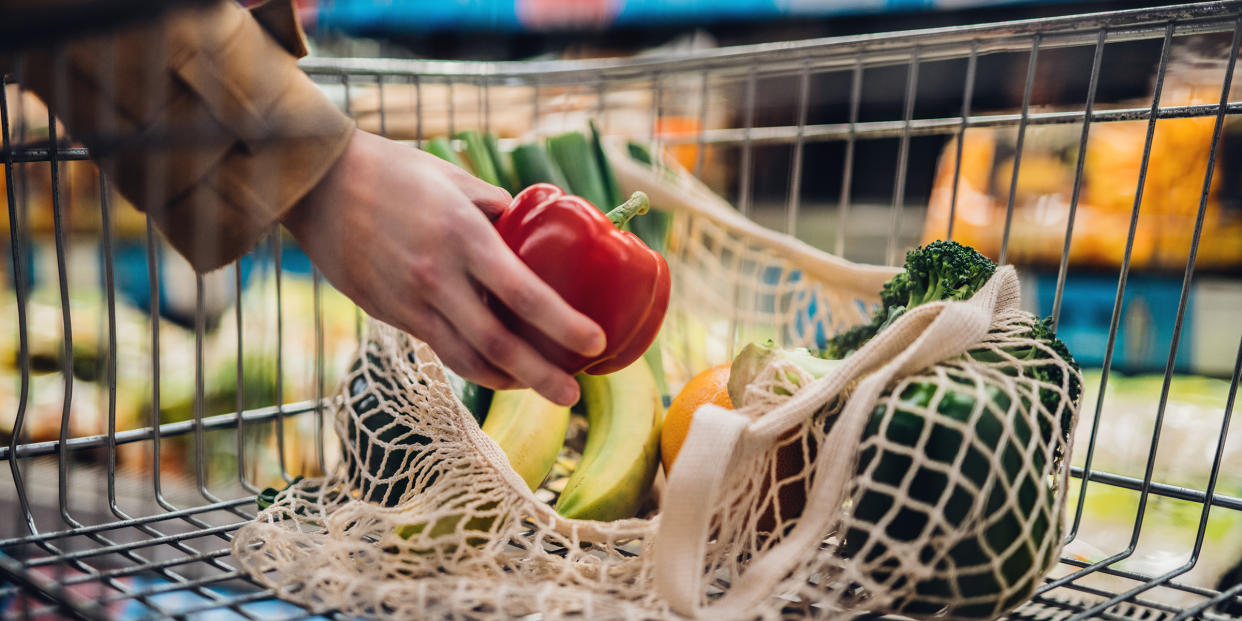Grocery prices are up. Here are 7 ways to save at the supermarket

With grocery prices going up due to inflation it can be hard to find the foods your family needs and enjoys. For many, getting a healthy (and affordable!) dinner on the table every night can be a challenge.
Diane McCrohan, associate professor and chair of the marketing department & management department in the College of Business at Johnson & Wales University told TODAY Food that there has been a large increase in protein costs as of late.
"The largest increase that we have seen is the 20% increase year to year in meat and veal prices, as well as chicken costs increasing 9% year to year," she said. "The biggest way to reduce this cost is to buy your meat in bulk and on sale. Then invest in a freezer and store your meat." When you see chicken on sale for 99 cents a pound, you'll be able to stock up!
McCrohan said another great strategy for shoppers looking to save cash is to sign up for store loyalty programs.
"Always sign up for the grocery store loyalty program," she said. "They offer member only deals that you do not need to cut coupons in order to get."
Jenna Helwig, personal chef and food director at Real Simple said on TODAY that it is possible to tackle your next food shop and cook meals that are easy on your wallet that the whole family will enjoy.
Shop frozen
Shopping the frozen aisle for fruits, vegetables and fish is a great money-saving strategy. "Frozen foods have a longer shelf life, which leads to less food waste," said Helwig. "Plus, when it comes to veggies like spinach and kale, they’re already washed and chopped for you."
For the best quality, look for “one ingredient” products that are frozen fresh (meaning nothing is added to them).
"In terms of dollar figures, berries are one of the most obvious places to save especially since they go bad so quickly and you end up throwing them away," said Helwig. "You can save $2 on 10 ounces of frozen raspberries as compared to fresh."
When it comes to shrimp (an easy protein to add to salads and pasta dishes) you can save about $7 a pound by buying frozen (plus those "fresh" shrimp are often previously frozen anyway!).
Make a plan
Helwig suggests shoppers check their fridges and pantries before heading out to the store. This way, you don't end up purchasing items you already have. Stick to your list and stay away from those impulse purchases.
"Check mailers and grocery store apps for weekly sales," said Helwig. "Plan your meals based on what’s marked down."
McCrohan said to not only shop with a meal plan in mind, but also to shop with a monetary budget.
Another smart strategy is to do your grocery shopping online so there are no surprises at the register.
Compare unit prices
McCrohan says it's essential to compare not just the price tag but the unit pricing when at the supermarket. "This will let you know the least expensive products to buy," she said. "Compare the unit pricing between store and national brands. You will notice large differences in cost." Oftentimes, the store brand and the national brand are processed in the same plant.
DIY snacks and ingredients
When it comes to saving serious cash on your grocery bill, Helwig suggests utilizing meal prep to your advantage. For example, shredding your own cheese and chopping your own veggies makes for a huge savings.
While snack-sized items can be convenient for school lunches, buying the biggest bag and then portioning out your own snacks will save you money.
"A regular container of Jif peanut butter costs 40% less than Jif To Go singles," said Helwig. "Instead, make your own 'singles' with tiny reusable containers."
If you’re buying in bulk, consider if any of the items can be frozen as leftovers. Always try to avoid waste, as food waste equals money waste said Helwig.
Shop interior aisles
"We hear a lot about 'shopping the perimeter' of the store for healthy items but there are many nutritious and less expensive items in the center aisles too," said Helwig. "Think beans, canned fish, brown rice, pasta, oats and jarred veggies."
For instance, canned salmon can be $5 a pound versus $20 plus a pound when bought fresh. "Canned is great for burgers and salads," said Helwig. "You'll see similar savings with canned tuna."
Shop multiple markets
If you want to save big, don't do all your shopping in one place.
“Look at the sale flyers and compare prices,” McCrohan said. “Do not do all your shopping at one supermarket. Take advantage of each one’s sales. Oftentimes supermarkets will have a few items at an excellent price just to get you in the store. Do not fall into the trap.” Buy the sales items that you need and move to the next supermarket.
Splurge on these items
While it's great to save on groceries, there are some items that are actually worth spending extra on said Helwig.
Extra virgin olive oil
"A quality EVOO doesn’t go through extensive processing like cheaper alternatives — meaning it’s packed with healthy compounds such as antioxidants and anti-inflammatory properties," said Helwig. "Another benefit to higher-quality EVOO is that it has a distinct flavor, making your veggies taste even better."
Pastured eggs
"A couple bucks more a dozen, but the flavor and nutrition are both better," said Helwig regarding eggs that come from chickens that roam free.

